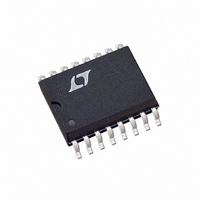LTC1064-2CSW Linear Technology, LTC1064-2CSW Datasheet - Page 7

LTC1064-2CSW
Manufacturer Part Number
LTC1064-2CSW
Description
IC FILTR 8TH ORDR LOWPASS 16SOIC
Manufacturer
Linear Technology
Datasheet
1.LTC1064-2CNPBF.pdf
(12 pages)
Specifications of LTC1064-2CSW
Filter Type
Butterworth, Lowpass Switched Capacitor
Frequency - Cutoff Or Center
140kHz
Number Of Filters
1
Max-order
8th
Voltage - Supply
±2.375 V ~ 8 V
Mounting Type
Surface Mount
Package / Case
16-SOIC (0.300", 7.5mm Width)
Lead Free Status / RoHS Status
Contains lead / RoHS non-compliant
Other names
LTC1064-2CS
Available stocks
Company
Part Number
Manufacturer
Quantity
Price
Company:
Part Number:
LTC1064-2CSW
Manufacturer:
LT
Quantity:
60
Part Number:
LTC1064-2CSW
Manufacturer:
LT/凌特
Quantity:
20 000
Company:
Part Number:
LTC1064-2CSW#PBF
Manufacturer:
Linear Technology
Quantity:
135
PI FU CTIO S
NC (Pins 1, 6, 8 and 13): The “no connection” pins should
be preferably grounded. These pins are not internally
connected.
V
18k resistor tied to the inverting input of an op amp. Pin
2 is protected against static discharge. The device’s
output, Pin 9, is the output of an op amp which can
typically source/sink 3mA/1mA. Although the internal op
amps are unity gain stable, driving long coax cables is not
recommended.
When testing the device for noise and distortion, the
output, Pin 9, should be buffered. (Figure 1) The op amp
power supply wire (or trace) should be connected
directly to the power source. To eliminate switching
transients from filter output, buffer filter output with a
third order lowpass (Figure 5).
AGND (Pins 3, 5): For dual supply operation these pins
should be connected to a ground plane. For single supply
operation both pins should be tied to one half supply,
(Figure 3).
V
capacitor to an adequate AGND. Low noise, nonswitching
power supplies are recommended. To avoid latchup when
the power supplies exhibit high turn-on transients, a
1N5817 Schottky diode should be added from the V
V
IN
+
–
, V
U
, V
pins to ground (Figures 1, 2 and 3).
–
OUT
(Pins 4, 12): Should be bypassed with a 0.1µF
U
(Pins 2, 9): The input Pin 2 is connected to an
U
(Pin Numbers Refer to the 14-Pin Package)
+
and
R
Pin 7 and Pin 14 is recommended. This connection should
be preferably done under the IC package. In a breadboard
use a one inch, or less, shielded coaxial cable: the shield
should be grounded. In a PC board, use a one inch trace or
less; surround the trace by a ground plane.
50/100 (Pin 10): The DC level at this pin determines the
ratio of clock frequency to the –3dB frequency of the filter.
The ratio is 50:1 when Pin 10 is at V
Pin 10 is at V
capacitor to analog ground when it’s connected to V
(Figure 1). See Tables 1 through 7 for typical gain and delay
responses for the two ratios.
f
1.4V. For ±8V and 0V to 5V supplies the logic threshold
levels are 2.2V and 3V respectively. The logic threshold
levels vary ±100mV over the full military temperature
range. The recommended duty cycle of the input clock is
50% although for clock frequencies below 500kHz the
clock “on” time can be as low as 200ns. The maximum
clock frequency for ±5V supplies is 4MHz. For ±7V sup-
plies and above, the maximum clock frequency is 7MHz.
Do not allow the clock levels to exceed the power supplies.
For single supply operation ≥6V use level shifting at Pin 11
with T
CLK
IN
A, OUT C (Pins 7, 14): A very short connection between
(Pin 11): For ±5V supplies the logic threshold level is
2
L levels (Figure 4).
–
. This pin should be bypassed with a 0.1µF
LTC1064-2
+
and 100:1 when
–
or V
10642fa
7
+

















